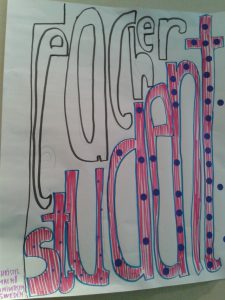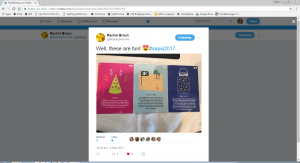We are delighted to have a guest post from Dr Catherine Bovill, Senior Lecturer in Student Engagement, Institute for Academic Development, University of Edinburgh:
The McMaster Summer Institute for Students as Partners was first run in 2016 and brings together researchers and practitioners interested and active in Students as Partners (SaP) work across the world. The second Summer Institute was held in May 2017 in Hamilton Canada, and focused on three strands of work: 1) SaP workshops to support students and staff to examine their existing SaP practice as well as planning for new SaP initiatives; 2) a Change Programme for teams of staff and students planning to enact SaP cultural change in their institutions; and 3) a writing retreat for staff and students collaborating in writing about SaP. I was fortunate to be invited to co-lead the workshops at this second Summer Institute with Sophia Abbott, Post-Baccalaureate Fellow for Collaborative Programs at Trinity University, Texas, USA and Lucy Mercer-Mapstone, PhD student in the Centre for Social Responsibility in Mining and Project Lead for Students as Partners Program Design at the University of Queensland Australia. We were a truly international facilitation team.

Six months prior to the Summer Institute, Sophia, Lucy and I met for the first time via Skype to get to know one another and to start planning the two SaP workshops focused on Course and Curriculum design, and on Teaching Learning and Assessment. This could have been very challenging, when three people from different backgrounds come together to co-facilitate four full days of workshops for staff and students from around the world. In reality, the experience was phenomenally positive. I have often reflected upon how many people working in the SaP field are quite like-minded: they are not only interested in partnership, but they are keen to walk the walk and model good partnership in practice. Thankfully, this was our experience of co-facilitation, we shared many of our goals and approaches to working, whilst remaining intellectually challenging and critical with one another.
Indeed, this heady mix of collegiality and criticality seemed to engender further and deeper exploration and thinking during the Summer Institute.
The Summer Institute as a whole attracted nearly 80 participants from nine countries; half of whom were students and half, staff members. Creating an ethos of collegiality and criticality within the workshops was key to enabling individuals and groups from institutions around the world to work constructively with one another. The workshops included participants from the UK, Sweden, the Netherlands, USA, Canada and Grenada. Some participants were very experienced in undertaking SaP work and had quite well developed SaP initiatives within their institutions. Other participants were new to SaP, such as the colleagues from Grenada. One of the most rewarding parts of the workshops was when some of our Grenadian colleagues reported how they had moved from feeling like outsiders, completely new to SaP and with little to share, to feeling included and valued members of the workshops with ideas and perspectives that were of great value to others. This sense of sharing from one another’s experiences and supporting one another in thinking through the challenges of culture change within different institutions, is absolutely at the heart of the Summer Institute for SaP.
I will share briefly three elements of the workshops that were highlights for me personally. First was a session I led on the importance of behaviour and language being consistent with the principles and values of SaP. This seemed to capture the imagination of participants and I appreciated the flexibility with which Sophia, Lucy and I worked together to provide more time for participants to explore this crucial aspect of SaP practice in more depth. According to feedback from the workshops, this session, and the extra time given to it, was clearly appreciated.

The second short session I enjoyed was when we used the Appreciate partnership cards produced by Sarah Dyer, University of Exeter. Participants were able to take time to try out some of the activities suggested by the cards as well as to reflect upon how they might use the cards in their own SaP work. Finally, I really enjoyed and learned from seeing the ways in which participants envisioned ideal forms of student-staff partnership. It was great to have space to discuss the thinking behind these visions and to see the visions inform the planning of real SaP activities across institutions internationally. It was an incredibly busy time in Canada – it was tiring but incredibly rewarding.
The Appreciate Partnership cards created by Sarah Dyer with support from the UK Higher Education Academy are available online: https://www.heacademy.ac.uk/knowledge-hub/appreciate-cards-support-appreciative-partnership-learning
